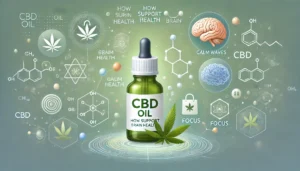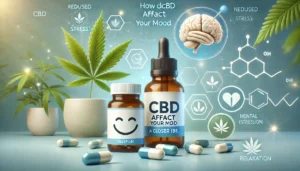
What is CBD
Cannabidiol, commonly known as CBD, is a compound derived from the cannabis plant that has gained significant popularity in recent years. Unlike its more famous counterpart, tetrahydrocannabinol (THC), CBD is non-psychoactive, meaning it does not produce the „high” associated with marijuana. This unique property, combined with its potential health benefits, has made CBD a subject of increasing interest among consumers and researchers alike. What is CBD
What is CBD and How Does It Work?
CBD is one of over 100 cannabinoids found in the cannabis plant. It is primarily extracted from hemp, a variety of cannabis that contains low levels of THC (typically less than 0.3%). This low concentration of THC makes hemp-derived CBD products legal in many countries, including the United States, where the 2018 Farm Bill legalized hemp cultivation.
How Does CBD Interact with the Body?
What is CBD‘s role in the body? CBD interacts with the endocannabinoid system (ECS), a complex cell-signaling system that plays a crucial role in regulating various physiological processes. The ECS consists of endocannabinoids, receptors, and enzymes. CBD is believed to influence the ECS by:
- Binding to Receptors: CBD primarily interacts with CB1 and CB2 receptors, which are found throughout the body and brain. By influencing these receptors, CBD can help modulate pain, inflammation, and mood.
- Inhibiting Enzymes: CBD may inhibit the activity of enzymes that break down endocannabinoids, thus prolonging their effects in the body.
Potential Health Benefits of CBD
Research into the health benefits of CBD is ongoing, but several promising areas have emerged:
- Pain Relief: Many users report relief from chronic pain and inflammation when using CBD products. Studies suggest that CBD may reduce pain by affecting endocannabinoid receptor activity and interacting with neurotransmitters.
- Anxiety and Depression: Preliminary studies indicate that CBD may help reduce anxiety and improve mood. It is believed to influence serotonin receptors in the brain, which play a role in mood regulation.
- Sleep Disorders: Some people use CBD to address sleep issues, including insomnia. Its calming effects may help improve sleep quality and duration.
- Neuroprotective Properties: CBD has shown potential in protecting neurons and may be beneficial in conditions like epilepsy and multiple sclerosis. The FDA has even approved a CBD-based medication, Epidiolex, for treating certain forms of epilepsy.
- Skin Health: Due to its anti-inflammatory properties, CBD is also being explored for its potential benefits in skincare, helping to reduce acne and other skin conditions.
Different Forms of CBD Products
What is CBD available in? CBD is available in various forms, catering to different preferences and needs:
- Oils and Tinctures: These are liquid extracts that can be taken sublingually (under the tongue) for quick absorption.
- Capsules and Softgels: These provide a convenient and precise dosage of CBD, ideal for those who prefer not to taste the oil.
- Edibles: CBD-infused foods and beverages, such as gummies and teas, offer a tasty way to consume CBD.
- Topicals: Creams, balms, and lotions infused with CBD can be applied directly to the skin for localized relief.
- Vapes: CBD can be vaporized and inhaled for rapid effects, although this method may not be suitable for everyone.
Legal Status of CBD
The legal status of CBD varies by country and state. In the United States, hemp-derived CBD products with less than 0.3% THC are federally legal, but some states have specific regulations. Always check local laws before purchasing or using CBD products.
Safety and Side Effects of CBD
CBD is generally well-tolerated, but it can cause side effects in some individuals, including:
- Fatigue
- Diarrhea
- Changes in appetite or weight
- Dry mouth
It is essential to consult a healthcare provider before starting any new supplement, especially for individuals taking medications or with underlying health conditions.
Conclusion
CBD represents a fascinating intersection of science, health, and wellness. While research continues to uncover its potential benefits, many people have already turned to CBD as a natural alternative for various health concerns. Whether you’re considering CBD for pain relief, anxiety management, or overall wellness, it is essential to choose high-quality products from reputable sources. Always consult with a healthcare professional to determine the best approach for your individual needs.
Key Takeaways
- CBD is a non-psychoactive cannabinoid derived from the cannabis plant, primarily from hemp.
- It interacts with the endocannabinoid system to potentially provide various health benefits.
- Forms of CBD include oils, capsules, edibles, and topicals.
- The legal status of CBD varies by region, so it’s crucial to stay informed about local regulations.
- Consulting a healthcare provider is recommended before starting CBD, especially if you have existing health conditions or take medications.
By understanding what CBD is and its potential uses, you can make informed decisions about incorporating it into your wellness routine.




